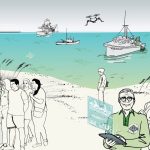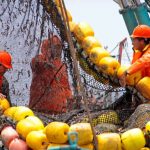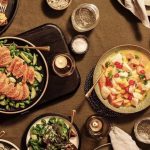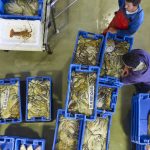Aker, Aker BioMarine, and Aker Seafoods have worked with WWF-Norway since 2006. The common goal is sustainable management of fish and krill, and combating illegal harvesting. Now, this partnership is being expanded.
In the period 2009 through 2011, joint activities will include promoting environmental labeling and ensuring traceability throughout the fisheries value chain, from harvesting through to products purchased by consumers. WWF-Norway will play the role as a critical sparring partner.
“Exchanging opinions and expertise provides valuable input for the development of more environmentally appropriate solutions. WWF is a vital source of inspiration in our efforts to strengthen global fish and krill resources. Challenges propel Aker — including dialogue with environmental activists and their organizations,” says Geir Arne Drangeid, Aker Senior Partner & EVP.
WWF-Norway’s marine programme will receive about NOK 1 million annually during 2009 – 2011 as a result of the partnership agreement with Aker.
“For the past three years, WWF has had an open and direct dialogue with Aker. Together we have achieved important results, particularly in the areas of environmental labeling of fish caught in Norwegian waters and combating the illegal fishing in the Barents Sea,” says WWF-Norway’s Secretary General Rasmus Hansson. “We look forward to continuing our cooperation with Aker; our experience is that the company is sincerely committed to securing sustainable management of species and ecosystems.”
Barents Sea cod populations are currently growing. For the first time in many years, marine researchers are reporting that cod reproductive capacity is good and that harvesting is sustainable. The rebound is partly attributable to less illegal fishing.
Environmental labeling of fish
WWF-Norway and Aker Seafoods are promoting environmental certification of cod and haddock. The seafood company already operates seven environmentally certified production facilities for saithe products. The Marine Stewardship Council (MSC) is in charge of the certification program, which guarantees that Norwegian saithe catches are sustainable and conducted in a lawful manner.
“The environment, traceability, and sustainable fisheries are top priorities for Aker Seafoods and its customers in Europe. Environmental certification of saithe sharply boosted demand for environmentally labeled saithe products,” says Aker Seafoods’ CEO Yngve Myhre.
WWF-Norway and Aker Seafoods will continue their mutual efforts to improve fisheries regulations and implement low-impact fishing practices in order to achieve sustainable harvesting.
Health-promoting ingredients from krill
Aker BioMarine is using a unique method for harvesting krill, called Eco Harvesting. Eco Harvesting results in minimal environmental impact, while providing optimal krill resources for processing into health-promoting dietary supplements, nutraceuticals, and food ingredients.
The biotechnology company is well on the way to becoming the first to provide products from environmentally certified Southern Ocean krill harvests. To date, MSC has conducted a pre-assessment that reported favorable feedback. WWF-Norway is actively participating in the project. Environmental certification is a precondition for Aker BioMarine to apply MSC’s environmental labeling to its krill products. MSC labelling assures customers that products are sustainable and that traceability has been maintained throughout the entire production value chain.
“The Antarctic is an incredibly rich yet vulnerable ecosystem. Aker BioMarine considers it absolutely essential that krill harvesting is done in a responsible and sustainable manner,” says the company’s CEO, Kjell Inge Røkke. “We do not intend to be a high-volume krill harvester. Our approach is to use ultra-modern technology in order to obtain maximum resource utilization and minimal environmental impact.”








